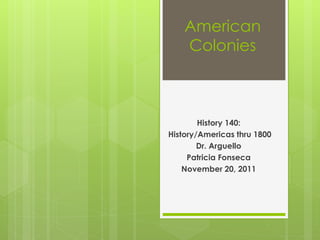
American Colonies
- 1. American Colonies History 140: History/Americas thru 1800 Dr. Arguello Patricia Fonseca November 20, 2011
- 2. Chapter 13 Pirates 1685-1730 For a time, England had used piracy as a means to attack the Spanish empire. By 1700, piracy was viewed as a liability to a successful empire. Piracy offered the ability to eat, drink, dance, gamble, and whore with abandon. It invited offended sailors to retaliate against the owners of merchant ships. Once pirates captured a vessel, the merchant captain was tried. Punishment ranged from severe whippings to execution. Pirates operated by a written term of agreement and each member signed the contract. Everyone received an equal share of the loot and the captain took a double share. They did, however, give wounded and crippled men extra amounts of the loot. Pirates greatly appreciated the ability to exploit others and defined freedom as the opportunity to prey on others. They loved the fact that piracy afforded them the opportunity to dish out violence rather than suffer violence. England decided to constrain piracy during 1697-1701. This was due to their attempt to control and defend colonial commerce, as well as to compel colonial merchants, legislators, and governors to acknowledge and cooperate with imperial authority. Parliament prosecuted any colonial merchants and governors that harbored or supplied pirates.
- 3. Chapter 13 Commerce and Empire The British became more powerful with the triumphs of war, establishing peace treaties, in creating the British Union, and in suppressing piracy. The Dutch accepted British military assistance in two massive wars. As the Dutch exhausted their taxpayers, ships, and commerce, they accepted an unequal alliance with England that left the Dutch as a second-rate power. Britain established a navy fleet larger than the size of France and Spain combined. The allocated major financial resources to naval experience which other countries failed to match. This provided the British colonies with a more secure method of shipping. Two-thirds of the British revenue was generated by taxes on commerce and the liquid capital of merchants primarily supplied the national loans. Commerce became extremely important to maintaining British power. American colonies became more important. As the British and their colonies became more successful in trade and war, the empire proved that Protestant Succession, the British Union, the common law, and individual liberties combined to create national wealth, imperial power, and individual happiness.
- 4. Chapter 14 Poverty In 1750-1760’s, the colonists experienced a rise in the number of their poor. Winter was especially hard when the ice prevented shipping and the employment rate slumped. The unemployed battled against starvation. Many had to enter the city maintained almshouse. Poverty was linked to wars as numerous men were killed, incapacitated, or turned alcoholic. Emigration brought a swarm of poor newcomers which lowered wages and increased unemployment all around. Colonists were extended loans from British creditors who were able to call in the payment of those debts at any given time. Colonists faced the problem of the growing population against the limited supply of available land taken from the Indians. Their choices were to look for work in the city, move west and fight the Indians for more land, or rent land in the east.
- 5. Chapter 14 Goods By 1770, many British and Asian goods had increased in value. The colonists experienced a shift in the trade market. They were paying stable prices for English manufactures as their produce increased in price. British competitors started extending credit to colonists which increased the colonist’s buying power. Approximately 90% of economic production remained within a colony for home consumption or local trade while only 10% was exported. Farmers did need to sell produce to be able to buy imported goods that they were unable to produce themselves. To increase status and credit, colonists expansive, ornamental homes with spacious grounds and fine furniture. They started to refine their manners and conversation. Common farmers were looked down on. Women asserted themselves as the leading consumers. Buying goods instead of making them greatly reduced the amount of tedious chores they performed.
- 6. Chapter 15 Revivals Revivals are periodical surges in fervor and new members within a religious congregation. Reverend Solomon Stoddard was a particularly vigorous minister and his congregations experienced revivals larger than congregations with less powerful ministers. Revivals were based on the emotional process of conversion that transformed sinners into saints who earned eternal salvation. The colonists held to a Calvinist theology, only diverting in the sense that they believed in the need to seek out evangelical preaching while reforming their behavior. They did not believe that behaving well would earn their salvation. Evangelical preachers delivered fearful sermons dedicated to soul-searching while painting a beautiful picture of what heaven will be. Evangelical preaching led listeners through despair to an ecstatic state of divine grace. Some listeners failed to advance to the state of divine grace and committed suicide instead. These suicides slowed down revivals until they stopped altogether.
- 7. Chapter 15 Radicals Evangelicals were subdivided into two groups: moderates and radicals. The major difference between the two groups was in their views of church and state institutions. Moderates believed church institutions belonged to this world and had to accommodate to its inequalities in wealth, status, and learning. Radicals believed in otherworldly churches that brought heaven to earth during worship that dissolved social distinctions. Moderates were between Old Lights and the radicals. They believed in revivals as God’s work but didn’t agree with emotional outbursts and self-righteousness. Radicals believed in free choice that justified separations and itinerants but did not believe in individualism. They created demanding communities within their congregations and referred to each other as “brother” and “sister. Their preachers tended to be poorly educated but charismatic. Worshipers gathered in open fields, private homes, and barns. They didn’t acknowledge social class, gender, or race during worship.